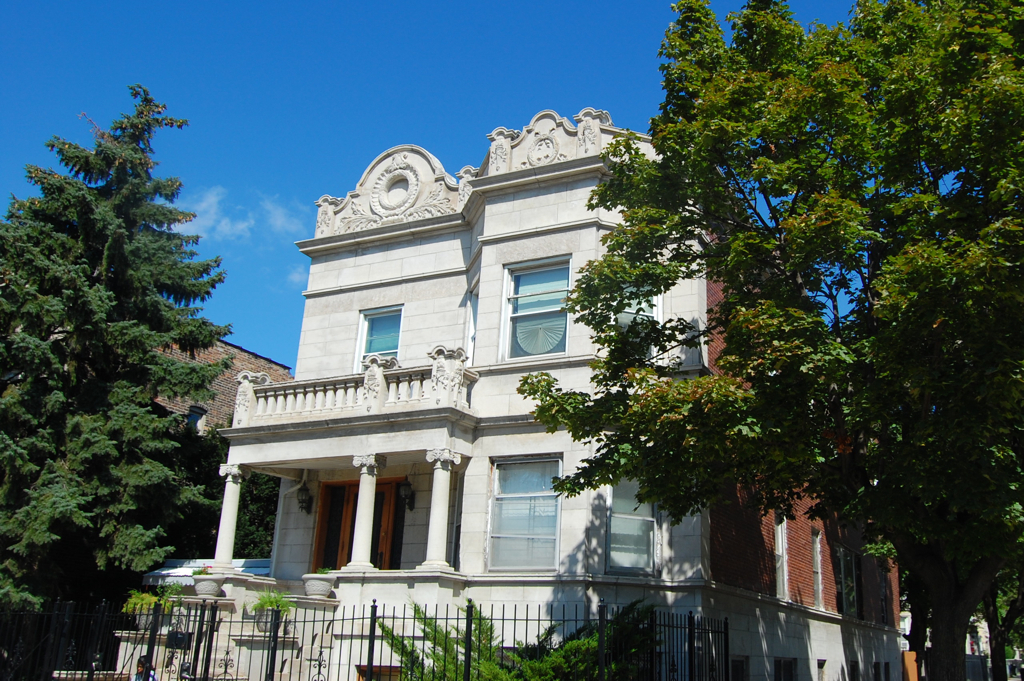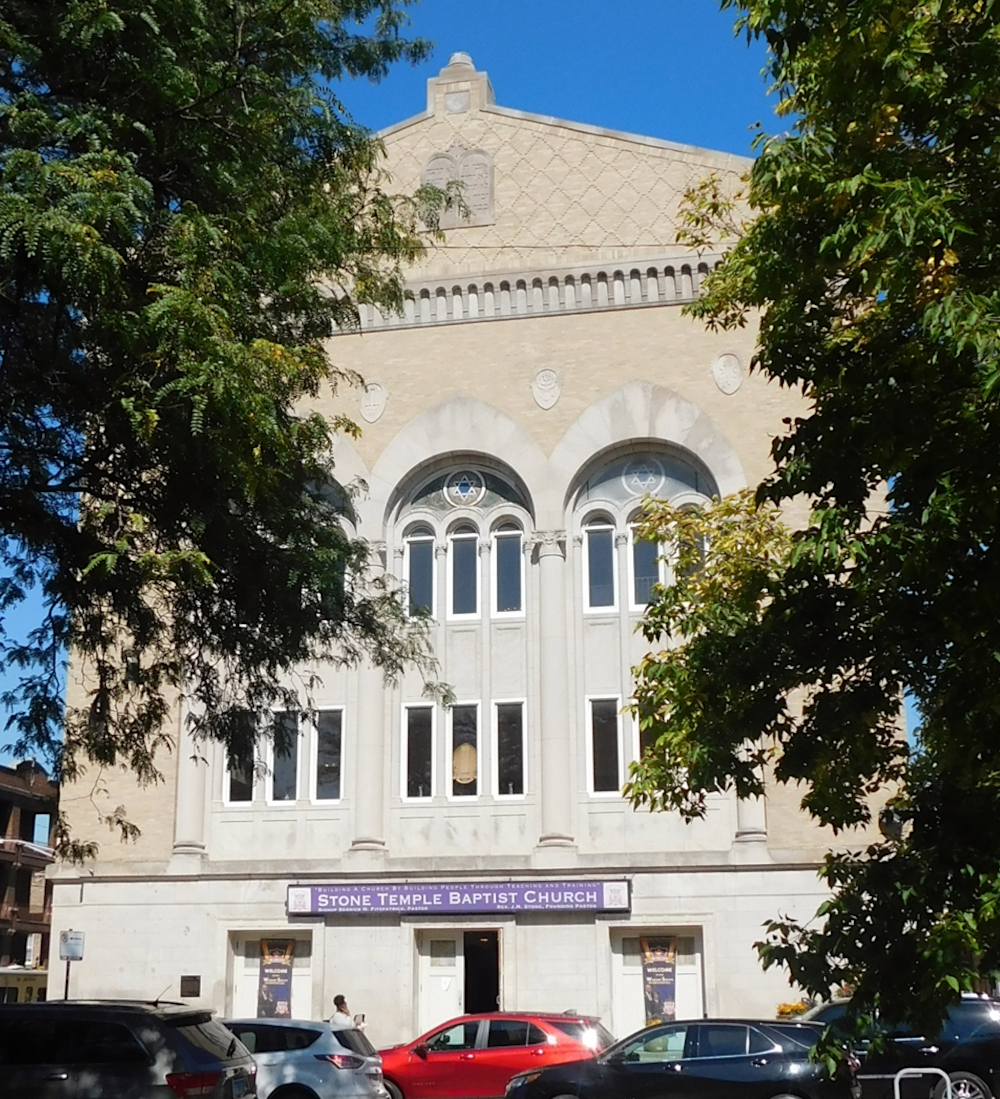Annamaria Leon was initially enchanted by the lush greenery of Douglass Park and the handsome greystone homes of North Lawndale, located on Chicago’s West Side. But it wasn’t until after she moved into the greystone she first rented and would eventually purchase that she realized what lay beneath the surface of the stunning architecture of the neighborhood and its showplace park: the ravages of decades of redlining, disinvestment and racial unrest.
“I got off the highway and I ended up in North Lawndale. I thought it was the most beautiful place in the world. Douglass Park, you know, and being a feng shui practitioner, you had the curved streets and the old houses with the big doors. I said, ‘oh my gosh, I want to live here,’” Leon said.

She also discovered that her new neighborhood had transformed from a predominantly Jewish enclave to an almost all Black area. This transformation is reflected in the naming of Douglass Park, visualized by architect William LeBaron Jenney and reimagined by world-renowned landscape architect Jens Jensen.
The park was originally Douglas Park, with one “s,” named for Stephen A. Douglas, who was instrumental in bringing the Illinois Central Railway to Chicago and famed for his debates with Abraham Lincoln. Due to his pro-slavery stance, the park was renamed in honor of abolitionists Anna and Frederick Douglass in 2020.
Leon, whose family origins are Filipino, dug in, and committed herself to applying her extensive knowledge in sustainable urban agriculture and permaculture to cultivating much-needed green spaces, enhancing resiliency against the effects of climate change, and improving the overall quality of life in the place she now considers her home.
Digging in
As the co-founder of both Permaculture Chicago Teaching Institute and Homan Grown, L3C, Leon applies her experience and expertise as a certified permaculture designer and dynamic educator. She also draws on years of experience with her former employer, Christy Webber Landscapes, where she developed a reputation for creating community gardens, including work on high profile commissions for garden installations in downtown Chicago's Millennium Park.
Leon has forged a number of collaborative relationships and built a deep reservoir of trust, establishing herself as a resource for enacting social change. She is recognized as a leader, and respected for her willingness to engage with other community stakeholders.
Her determination to grow roots in North Lawndale is consistent with that overall world view.
“When I look at the condition of the groups in my community, if they're in need, if they're hurting, I need to do something about that. Because my life is the groups that make up my community. I’m a connector…If you don't share your ideas with the people in your community, it doesn't work; it's only like you talking into the mirror. Those bonds of trust are what makes a community happen,” Leon said.
For Leon, environmental elements such as abundant green spaces are essential to the overall health of any community, including to provide a cooling effect as climate-fueled heat waves threaten urban areas. North Lawndale, she believes, is not and should not be an exception.
She is outspoken about calling out bad actors as opportunists seeking to exploit the community for their own political or financial gain — or both.
“If I see that all you're doing is using the community, and to use a phrase, being a ‘poverty pimp,’ no, I'm not going to be with you. I'm not going to help you. Because unless you alter and transform how you see my community, why would I engage with you?” Leon said.
At the same time, she also looks to allies to facilitate acceptance among community members who trust them, but who do not yet know her.
“Even though I've been there [for years], I haven't been there [for] generations. And I'm also not African American. If I can't be effective in [communication with stakeholders], I want somebody else who can be effective in that, and I want to make sure that we're all on the same page. But I am also not going to dictate how they express that.
“I need to find somebody who can break down those barriers for me… My commitment is to have North Lawndale thrive, to have people find beauty wherever they are, and for them to be self-expressed. That's what guides me in my work. If it's about architecture, if it's about biking, if it's about healthcare, is that providing beauty? Is it having people be self-expressed in their life? Then I'm for that,” Leon said.
Frustration and municipal red tape
Like many Black, Brown and Indigenous communities, North Lawndale suffers from disinvestment, including a paucity of green spaces. But the community’s reception of Chicago Department of Planning and Development proposals was initially lukewarm, Leon said. Leon persuaded community members to attend subsequent meetings and take an active role in executing various green space initiatives.
“We had a lot of people come because they trusted me. Like, if Annamaria is asking us to do something, let's go,” Leon said.
But Leon also expressed frustration with dealing with the territorialism that often occurs with municipal politics.
“If our federal government, our local government, our city government, our alderpeople, when they say ‘Hey, I'm going to assist you with this project’ and they actually assist you with the project, and [if] they created it in a way that it is planned to succeed versus planned to fail, then this becomes stronger and stronger and stronger,” Leon said. “But there's so many agendas out there. We can't work like that anymore.”
For instance, a number of proposed greening projects in North Lawndale have run into significant hurdles, some of which Leon suspects were integrated by design. She highlighted one instance where a contract for green space maintenance in various lots was given to an organization with no experience doing that work.
“Why does the city then put it on the community? And then the community fails. Then they say, see, ‘we tried and they couldn't take care of it.’”
Another project, Leon says, was a plot that featured pollinator-friendly plants that instead have simply been mowed, defeating the purpose of the original design.
“I'm part of the tree equity collaborative. I'm part of the urban heat island watch. And trees are great. But if you look at the heat index, it's still high. And so, you have to have deep roots in the soil to bring up that water up. And [the greenery] becomes like an air conditioner.”
Making an impact
Despite dealing with red tape and other hurdles, Leon and her allies have made significant headway with adding green spaces, both for recreation and as a vehicle for facilitating community and economic development in North Lawndale.
For example, the North Lawndale Greening Committee recently expanded their portfolio of edible community gardens from 14 to 20, utilizing a city program to develop vacant lots while providing paid employment to residents of the community, Leon said.
During a recent presentation at the Morton Arboretum, located in the Chicago suburb of Lisle, Leon also described several projects administered by Stone Temple Baptist Church, a former Jewish synagogue located in North Lawndale, including a vacant lot that has been converted to a community garden and performance space. The church has also created a free community store stocked with donated furniture, Leon said.

A new cafe and flower shop is also scheduled to open in the near future, operating on a donation basis to avoid paying hefty zoning fees, Leon explained during her presentation.
And while grants have been a significant source of funding for various green space projects in North Lawndale, Leon and her collaborators are working toward greater community autonomy in furthering their mission of improving the neighborhood and its green spaces.
“We've received almost $2 million in grants, but we're weaning ourselves off of the grants. I don't think we can fully, but you know grants are fickle and you have to fulfill what the grantor wants. Sometimes it takes people off of their mission.”
For Leon, good management of green spaces provides a potentially useful blueprint for improving the overall quality of life — for North Lawndale, for the city and beyond.
“It's land tenure. It's the way you manage your resources. It's also societal, how you create your society. Is it hierarchical? Is it linear? You could just look at the soil. What makes a soil fertile is there's a lot of the little organic microorganisms in there,” Leon said. “But those microorganisms live because they have air and they have good shelter that's not poison, which is the soil. And it has good maintenance, and they respect each other's boundaries and they collaborate.
“So that's what makes a good society as well.”
